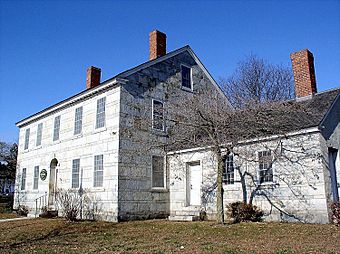William Jillson Stone House facts for kids
Quick facts for kids |
|
|
William Jillson Stone House
|
|
 |
|
| Location | 561 Main St., Willimantic, Connecticut |
|---|---|
| Area | 1 acre (0.40 ha) |
| Built | 1825 |
| NRHP reference No. | 71000912 |
| Added to NRHP | August 05, 1971 |
The William Jillson Stone House is a special old house in Willimantic, Connecticut. It's now a historic house museum where you can learn about the past. This unique stone house was built between 1825 and 1827 by William Jillson, an important person in the early days of industry in the area. Today, the Windham Historical Society takes care of it. The house was added to the National Register of Historic Places in 1971 because of its historical importance.
Contents
What the House Looks Like
The William Jillson Stone House stands on the south side of Jillson Square Park. It looks out over Main Street and the Willimantic River. This house is two stories tall and built from local granite stones. The stones are laid in rows that switch between wide and narrow.
House Walls and Shape
The walls of the house are very thick, about 17 inches (43 cm) wide! A smaller, one-story part of the house sticks out to the right side. The front of the house has five sections, called bays. The main door is in the middle, set inside a rounded archway.
Inside the Stone House
Inside, the house has a central hallway with rooms on either side. The wooden decorations around the doors, windows, and fireplaces are quite simple. This design was common for homes of that time.
History of the Jillson Stone House
This house is important because it's one of the few stone houses in the area. It was also the home of William Jillson, who came from Cumberland, Rhode Island. He was one of the first people to buy rights to use the water power from the Willimantic Falls for factories.
William Jillson and Local Industry
William Jillson and his brothers started several factories in the Willimantic area. These factories eventually grew into the American Thread Company. This company became the biggest employer in Willimantic for many years. The house itself was built using the same type of stone that came from the riverbed, just like some of the factories.
Saving a Piece of History
After William Jillson passed away, the house was divided into apartments. For a while, one of the factories even used it for storage. In 1920, a single family bought the house again. Later, people who cared about history in the area saved the house from being torn down. The historical society worked to restore it in the 1970s. Today, the rooms are decorated to show what a factory owner's home might have looked like in the early 1800s.
See also



